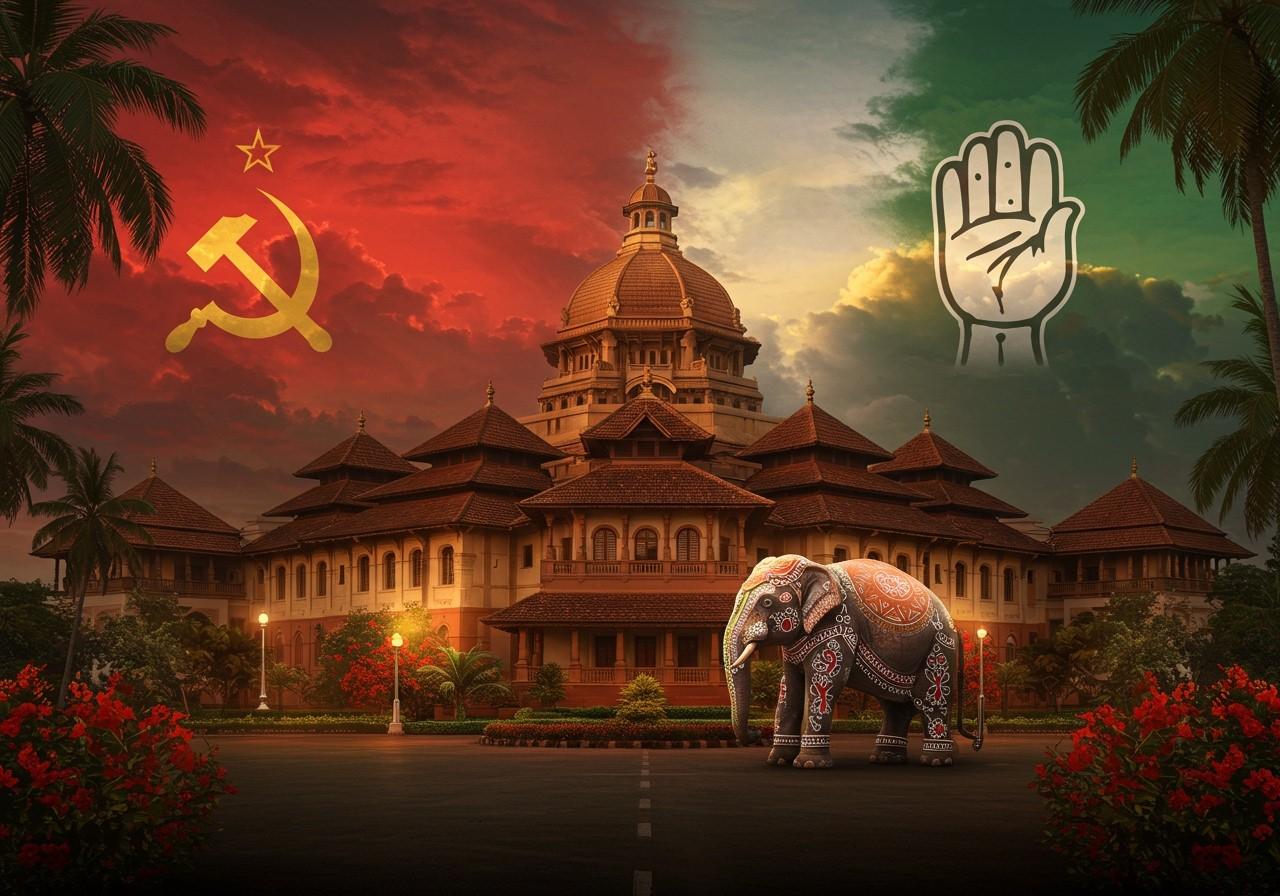
Kerala, often called ‘God’s Own Country,’ is a state in Southern India known for its rich culture, beautiful landscapes, and progressive governance. This article explores Kerala’s governance and political landscape, offering insights into key figures like the Governor and Chief Minister, and the functioning of the Kerala Legislative Assembly. Understanding these aspects provides a clear view of how Kerala’s political system works.
Kerala’s Political Structure
Kerala functions within a parliamentary representative democracy. Its political structure comprises the Governor, Chief Minister, and the Kerala Legislative Assembly. Here are the key components:
- Governor: The Governor of Kerala serves as the constitutional head of the state, possessing powers such as summoning and proroguing the Legislative Assembly, granting assent to bills, and recommending President’s rule during political instability. The Governor’s role is primarily ceremonial, but they also act as a vital link between the state and the central government. Their responsibilities include appointing the Chief Minister and other key officials.
- Chief Minister: The Chief Minister leads the state government and holds executive authority. They are responsible for policy-making, administration, and spearheading the state’s development programs. The Chief Minister is chosen by the elected members of the Legislative Assembly and holds the most powerful position in the state government.
- Kerala Legislative Assembly (Niyamasabha): The Assembly is the state’s law-making body, consisting of elected representatives who deliberate and pass laws governing Kerala. It plays a crucial role in shaping state policies, approving the budget, and holding the executive branch accountable. Key committees within the Assembly handle specific functions, ensuring efficient legislative processes.
- Political Parties: Kerala’s political landscape is vibrant, with major parties including the Communist Party of India (Marxist) (CPI(M)), the Indian National Congress (INC), and the Bharatiya Janata Party (BJP). Coalition politics frequently play a significant role in governance, with alliances like the Left Democratic Front (LDF) and the United Democratic Front (UDF) influencing government formation.
- Electoral Process: Representatives for the Kerala Assembly are elected through periodic elections where voters choose candidates from their respective constituencies. Kerala has a history of high voter turnout, reflecting the active participation of citizens in the democratic process.
- Local Self-Governments: Panchayats and Municipalities are local governing bodies responsible for grassroots administration. They play a crucial role in local development and citizen engagement, ensuring effective governance at the community level.
- State and Central Government Relationship: The state government works in coordination with the central government on various matters, ensuring effective implementation of national policies and programs at the state level. This collaborative approach facilitates development and addresses issues of national importance.
Kerala’s Governor
The Governor of Kerala is a significant constitutional figure. Here’s an overview:
- Current Governor: Arif Mohammad Khan has served as the Governor since September 2019. His background includes a distinguished career in politics and public service.
- Appointment Process: The President of India appoints the Governor for a five-year term. The appointment is based on the recommendation of the central government.
- Responsibilities: The Governor’s duties include summoning the Legislative Assembly, granting assent to bills, and managing political crises. They act as the chancellor of state universities and perform various ceremonial functions.
- Legislative Role: The Governor plays a role in the legislative process by approving bills passed by the Assembly. They can also reserve certain bills for the President’s consideration.
- Powers in Political Instability: In situations of political instability, the Governor can recommend President’s rule, suspending the state government and bringing the state under direct central control.
- Governor-Chief Minister Interaction: The Governor works closely with the Chief Minister on matters of governance, providing guidance and ensuring smooth functioning of the state administration.
- Key Actions: Governor Khan has been involved in various key decisions and initiatives during his tenure, addressing critical issues facing the state.
- Historical Context: Kerala has had a series of Governors who have played significant roles in the state’s political history, shaping its development and governance.
Kerala’s Chief Minister
The Chief Minister of Kerala is a pivotal figure in the state’s governance. Here’s a look at their role:
- Current Chief Minister: Pinarayi Vijayan has been in office since May 2016, leading the Left Democratic Front (LDF) government. His background includes a long career in communist politics and social activism.
- Election Process: The Chief Minister is chosen by the elected members of the Legislative Assembly from the majority party or coalition. They are formally appointed by the Governor.
- Responsibilities: The Chief Minister’s responsibilities encompass policy-making, administration, and leading development programs. They oversee the state’s executive branch and represent the state in interactions with the central government and other states.
- Major Initiatives: Vijayan’s tenure has seen various significant programs and initiatives aimed at social welfare, economic development, and infrastructure improvement.
- Legislative Role: The Chief Minister participates in debates and law-making in the Assembly, representing the government’s stance on key issues. They also play a crucial role in guiding the legislative agenda.
- Interaction with Opposition: The Chief Minister engages with opposition parties in the Assembly, addressing their concerns and fostering a healthy democratic dialogue.
- Challenges in Governance: The Chief Minister faces various challenges in managing the state’s diverse needs and addressing complex issues related to development, social justice, and environmental sustainability.
- Historical Overview: Kerala has had a history of influential Chief Ministers who have shaped the state’s political and social landscape, contributing to its unique identity.
Kerala Legislative Assembly
The Kerala Legislative Assembly shapes the state’s policies. Key points about its functioning:
- Composition: The Assembly has 140 elected members representing various constituencies across the state. The number of seats from each constituency is determined based on population.
- Legislative Process: The legislative process involves several stages, from the introduction of a bill to its enactment as law. This includes debates, committee reviews, and voting by the Assembly members.
- Key Committees: Various committees within the Assembly play important roles, such as scrutinizing bills, examining government policies, and addressing specific issues. These committees contribute to the efficiency and effectiveness of the legislative process.
- Speaker’s Role: The Speaker presides over the Assembly sessions, maintains order, and ensures adherence to parliamentary procedures. They play a crucial role in facilitating debates and ensuring smooth functioning of the Assembly.
- Major Debates and Laws: The Assembly has been the venue for numerous landmark legislative discussions and the passage of significant laws impacting the state’s development and governance.
- Interaction in Sessions: The Assembly sessions witness dynamic interactions between the ruling party and opposition, reflecting the diverse political viewpoints and fostering a healthy democratic debate.
- Impact on Daily Life: The decisions made by the Assembly directly affect the daily lives of Kerala residents, shaping various aspects of their lives, from education and healthcare to infrastructure and social welfare.
- Historical Milestones: The Kerala Legislative Assembly has witnessed significant historical events, reflecting the evolution of the state’s political landscape and its journey towards progressive governance.
Kerala’s Political Dynamics
Kerala’s political landscape has unique features:
- Ideological Influence: Socialism and communism have had a significant impact on Kerala politics, shaping its policies and social programs. The state has a strong tradition of left-wing politics, which has contributed to its unique socio-political landscape.
- Voter Demographics: Different voter groups, based on factors such as caste, religion, and socio-economic background, influence election outcomes. Understanding these demographics is crucial for analyzing political trends and predicting election results.
- Coalition Politics: Alliances between political parties play a significant role in Kerala’s governance. Coalition governments are common, requiring parties to collaborate and negotiate on policy decisions.
- Caste and Religion Role: Social factors, including caste and religion, have an influence on political affiliations and voting patterns. These factors play a role in shaping the political landscape and electoral outcomes.
- Major Political Events: Key events in Kerala’s political history have shaped its current political dynamics. These events include major political movements, shifts in party alliances, and landmark policy decisions.
- National Impact: National-level politics and policies have an effect on state governance, influencing resource allocation, policy implementation, and overall development strategies.
- Grassroots Movements: Local political movements and citizen activism play a role in shaping public opinion and influencing government policies. These grassroots movements contribute to a vibrant and participatory democracy.
- Election Analysis: Analyzing trends from recent election results provides insights into the evolving political landscape, voter preferences, and the effectiveness of various campaign strategies.
How Poojn.in Supports Kerala’s Traditional Rituals
Poojn.in, India’s largest cultural goods and services store, offers Green Maskalai Dal and Sakha, essential ingredients used in various Kerala traditions and ceremonies. These authentic products are available in multiple convenient sizes to suit different ritual needs. Explore our extensive collection of incense sticks and Laddu Gopal Murti for a complete spiritual experience.
Conclusion
Kerala’s governance and political landscape represent a unique blend of rich traditions and progressive ideals. The roles of the Governor and Chief Minister, the functioning of the Kerala Legislative Assembly, and the influence of various political parties and local self-governments all contribute to the state’s distinctive political environment. Understanding these key elements helps in appreciating how Kerala’s political system operates and its impact on the daily lives of its residents. By staying informed about these aspects, you can better connect with the state’s vibrant culture and its forward-thinking approach to governance. Explore more about Kerala’s temples and cultural heritage on poojn.in: Kerala Temple Architecture, Kerala’s Sacred Foods, Guruvayur Temple Guide, Thirumandhamkunnu Temple, and Thirunelly Temple.


